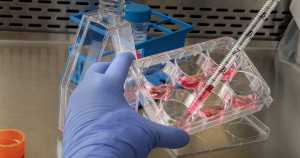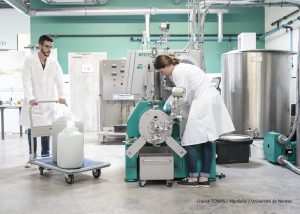Capacités develops an enzyme for biotech company DNA Script
Sourcing, modeling and high-throughput screening of DNA synthesis enzymes

Key words
Linked expertise
Cycle Farms relied on Capacités’ experts in enzymatic and bioprocess engineering to add a biocatalyst to its animal nutrition products.
Capacités’ engineers recommended using spray-drying, a well-known food industry process. Since it requires a temperature increase, the experts first carried out various tests to ensure the enzyme remains undamaged.
The next step was to blend the resulting enzyme powder with granulated insect meal. The main goal was to validate a formula in which both elements could be fully combined and not dissolve in water.
A custom fat/oil coating was therefore added to complete this new manufacturing process.
Finally, Capacités’ experts confirmed that the enzymes had remained active in the final product. They also checked the product’s stability in realistic storage conditions, with temperatures reaching 30°C and in up to 80 % moisture content. At the end of this project, Cycle Farms’ new recipe contained a stable enzyme compatible with the constraints of industrial manufacturing, product storage and use.
To successfully complete this project, the Capacités’ experts benefited from support and technical equipment from the UFIP laboratory (Protein Functionality and Engineering Unit), joint research unit of Université de Nantes and CNRS (The French National Centre for Scientific Research).
Our projects
These projects may also interest you

Sourcing, modeling and high-throughput screening of DNA synthesis enzymes

A company that manufactures pharmaceutical grade hyaluronic acid contacted Capacités’ enzyme engineering experts: the company aims at developing a new deacetylation process which keeps overall polymer structure while increasing its interactions with stem cells.

Capacités was entrusted for the implementation of the biorefinery process, as well as scaling it up for routine.

L’Oréal called upon the experts at the GEPEA Laboratory and Capacités in order to assist in bridging this methodological gap. The resulting new process has served to assist L’Oréal in developing methods for evaluating the biodegradability of their products, thus allowing them to better adhere to the strict regulatory requirements.
This site uses cookies and gives you control over what you want to enable